| Listing 1 - 10 of 13 | << page >> |
Sort by
|
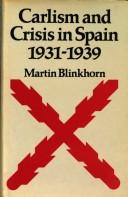
ISBN: 0521207290 0521086345 0511561040 9780521207294 Year: 1975 Publisher: Cambridge: Cambridge university press,
Abstract | Keywords | Export | Availability | Bookmark
 Loading...
Loading...Choose an application
- Reference Manager
- EndNote
- RefWorks (Direct export to RefWorks)
This is a study in English of the Carlist Movement, the extreme right-wing party in Spain, during the climactic decade of the 1930s. Carlism represents the oldest existing movement of the traditionalist right in Europe. In 1931 Carlists had already been in conflict with Spanish liberalism and leftism for over a century, seeking to reverse the trends of the nineteenth century and restore a religiously inspired corporative monarchy and harmonious society. During the 1930s they attacked and plotted the overthrow of the democratic Second Republic, participated in the rising of 1936 and then played a major political and military role within Nationalist Spain. Dr Blinkhorn discusses Carlism's internal politics, power struggles and sources of support; its ideology; its relations with other elements in the Spanish right, principally Falangism and Catholic conservatism; its attitude towards the Republic, liberalism and the left; its view of contemporary events elsewhere in Europe; its stress on paramilitarism and conspiracy against the Republican regime; and its wartime role.
Carlists --- Spain --- Politics and government --- Carlism --- -Carlists --- Arts and Humanities --- History --- Spain - Politics and government - 1931-1939 --- Carlists.
Book
ISBN: 0333006321 9780333006320 Year: 1973 Publisher: London: MacMillan,
Abstract | Keywords | Export | Availability | Bookmark
 Loading...
Loading...Choose an application
- Reference Manager
- EndNote
- RefWorks (Direct export to RefWorks)
Spain --- Politics and government --- History --- Spain - Politics and government - 1931-1939 --- Spain - History - Civil War, 1936-1939
Book
ISBN: 1849350795 Year: 2013 Publisher: New York : AK Press,
Abstract | Keywords | Export | Availability | Bookmark
 Loading...
Loading...Choose an application
- Reference Manager
- EndNote
- RefWorks (Direct export to RefWorks)
Anarchism -- Spain -- History. --- Spain -- Politics and government -- 1931-1939. --- Syndicalism. --- Management --- Syndicalism --- Anarchism --- Anarchists --- Working class --- Employee participation --- History. --- History.
Book
ISBN: 9788499652979 8499652972 Year: 2016 Volume: 15 Publisher: Barcelona: Institut d'estudis catalans,
Abstract | Keywords | Export | Availability | Bookmark
 Loading...
Loading...Choose an application
- Reference Manager
- EndNote
- RefWorks (Direct export to RefWorks)
Book
ISBN: 2714411320 9782714411327 Year: 1978 Publisher: Paris: Belfond,
Abstract | Keywords | Export | Availability | Bookmark
 Loading...
Loading...Choose an application
- Reference Manager
- EndNote
- RefWorks (Direct export to RefWorks)
Communism --- Communisme --- History --- Histoire --- Partido Obrero de Unificación Marxista --- Spain --- Espagne --- Politics and government --- Politique et gouvernement --- Partido Obrero de Unificación Marxista --- Communism - Spain - History --- Spain - History - Civil War, 1936-1939 --- Spain - Politics and government - 1931-1939
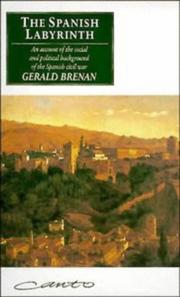
ISBN: 0521398274 Year: 1990 Publisher: Cambridge New York Sydney Cambridge University Press
Abstract | Keywords | Export | Availability | Bookmark
 Loading...
Loading...Choose an application
- Reference Manager
- EndNote
- RefWorks (Direct export to RefWorks)
Spain --- History --- Politics and government --- Social conditions --- 1886-1931 --- 1931-1939 --- 1886-1939 --- Spain - Politics and government - 1886-1931. --- Spain - Politics and government - 1931-1939. --- Spain - Social conditions - 1886-1939. --- Spain - History - Civil War, 1936-1939.
Book
ISBN: 1604866497 1604866519 9781604866513 9781604866490 9781604864014 160486401X Year: 2011 Publisher: Oakland, Calif. : London : PM ; Turnaround [distributor],
Abstract | Keywords | Export | Availability | Bookmark
 Loading...
Loading...Choose an application
- Reference Manager
- EndNote
- RefWorks (Direct export to RefWorks)
In Farquhar McHarg's autobiography, a young boy from Glasgow finds himself in the middle of Barcelona's revolutionary underworld at the tail end of World War I. Volume One chronicles McHarg's liaisons between the British Secret Service Bureau and the Spanish anarchists. McHarg tells of a corrupt Spanish regime bent on crushing a rebellious working class and the generous and recklessly idealistic men and women who struggled to transform it after rejecting traditional party politics. When a lifelong friend and fellow anarchist was gunned down
Anarchism -- Spain -- History -- 20th century. --- Anarchists -- Spain -- Biography. --- McHarg, Farquhar. --- Revolutions --Spain -- History -- 20th century. --- Spain -- History -- Civil War, 1936-1939. --- Spain -- Politics and government -- 1931-1939. --- Anarchists --- Anarchism --- History
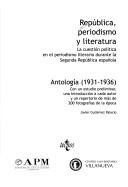
ISBN: 8430943501 9788430943500 Year: 2005 Publisher: Madrid: Tecnos,
Abstract | Keywords | Export | Availability | Bookmark
 Loading...
Loading...Choose an application
- Reference Manager
- EndNote
- RefWorks (Direct export to RefWorks)
¡El arte produce inquietud, la ciencia tranquiliza!, dice el pintor Georges Braque (1882-1963), refiriéndose al arte contemporáneo. Ambas sensaciones le están esperando al lector cuando recorra las páginas de esta antología. Sentirá que la historia se levanta de la página y se hace vida con el arte del peiodismo literario.Las más de doscientas ilustraciones le harán sentir que ese tiempo ha pasado, los hechos vuelven a dormir en la historia en tranquilizadoras conclusiones científicas. Va a ser una experiencia irrepetible para el lector, que previamente dispone de dos estudios introductorios: uno sobre el periodismo en el quinquenio republicano y otro sobre los límites del periodismo literario. Asu vez, a cada autor seleccionado le acompaña una introducción que contextualiza los artículos.
Spanish literature --- History and criticism --- Spain --- Politics and government --- History --- Literature and the war --- 1931-1939 --- Periodicals --- Politics and literature --- 20th century --- Spanish periodicals --- Spanish literature - 20th century - History and criticism --- Spain - Politics and government - 1931-1939 --- Spain - History - Civil War, 1936-1939 - Literature and the war
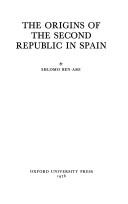
ISBN: 0198218710 9780198218715 Year: 1978 Publisher: London: Oxford university press,
Abstract | Keywords | Export | Availability | Bookmark
 Loading...
Loading...Choose an application
- Reference Manager
- EndNote
- RefWorks (Direct export to RefWorks)
Republicanism --- Républicanisme --- Spain --- Espagne --- Politics and government --- History --- Politique et gouvernement --- Histoire --- -Political science --- -Politics and government --- -Republicanism --- -Spain --- Républicanisme --- Espanja --- Spanien --- Hiszpania --- Spanish State --- España --- Estado Español --- Hispania --- Sefarad --- Sepharad --- Shpanye --- Shpanie --- Reino de España --- Kingdom of Spain --- Reino d'Espanya --- Reinu d'España --- Espainiako Erresuma --- Regne d'Espanya --- Reiaume d'Espanha --- Espanya --- Espanha --- スペイン --- Supein --- イスパニア --- Isupania --- Political science --- Republicanism - Spain --- Spain - Politics and government - 1923-1930 --- Spain - Politics and government - 1931-1939
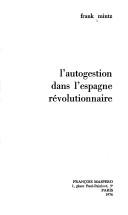
ISBN: 2707108731 9782707108739 Year: 1976 Publisher: Paris: Maspero,
Abstract | Keywords | Export | Availability | Bookmark
 Loading...
Loading...Choose an application
- Reference Manager
- EndNote
- RefWorks (Direct export to RefWorks)
Bibliotheek François Vercammen
Anarchism --- Syndicalism --- Spain --- Politics and government --- -Collectivism --- -Social movements --- Labor unions --- Totalitarianism --- Anarchism and anarchists --- Anarchy --- Government, Resistance to --- Libertarianism --- Nihilism --- Socialism --- -Anarchism --- Collectivism. --- -Spain --- -Anarchism and anarchists --- Espanja --- Spanien --- Hiszpania --- Spanish State --- España --- Estado Español --- Espagne --- Hispania --- Sefarad --- Sepharad --- Shpanye --- Shpanie --- Reino de España --- Kingdom of Spain --- Reino d'Espanya --- Reinu d'España --- Espainiako Erresuma --- Regne d'Espanya --- Reiaume d'Espanha --- Espanya --- Espanha --- スペイン --- Supein --- イスパニア --- Isupania --- Collectivism --- Anarchism - Spain --- Syndicalism - Spain --- Spain - Politics and government - 1931-1939
| Listing 1 - 10 of 13 | << page >> |
Sort by
|

 Search
Search Feedback
Feedback About UniCat
About UniCat  Help
Help News
News